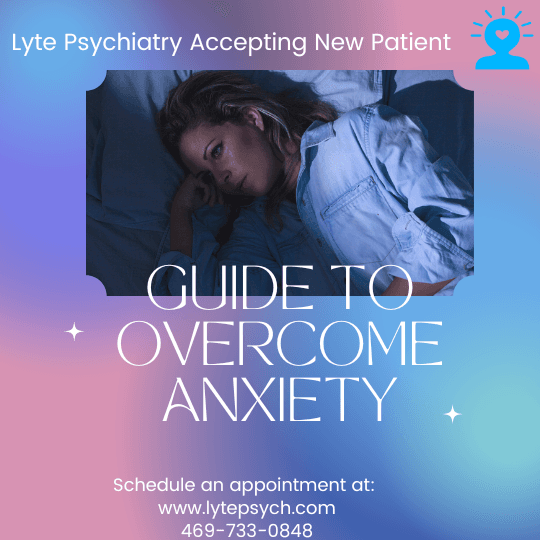Wed May 22 2024
Anxiety Disorders: Effective Strategies from Lyte Psychiatry to Deal with Anxiety (Best Adults and Adolescents Therapist and Psychiatrist Near You), Affordable Therapists and Psychiatrists Near You, Dallas, Fort Worth, TX

Anxiety Techniques for Calm (Best Adults and Adolescents Therapists and Psychiatrists) Affordable Therapists and Psychiatrists Near You, Dallas, Fort Worth, TX
From work deadlines to personal responsibilities, the demands of daily life can often leave us feeling anxious and stressed. However, conquering anxiety is not an impossible feat. You can find calm amidst the chaos with the right techniques and mindset. In this blog, we'll explore some effective strategies for overcoming anxiety and achieving a sense of peace and tranquility in your life.
1. Practice Mindfulness:
Mindfulness involves focusing your attention on the present moment without judgment. By practicing mindfulness meditation regularly, you can train your mind to become more aware of your thoughts and feelings, helping you to better manage stress and anxiety.
2. Deep Breathing Exercises:
Deep breathing exercises are a simple yet powerful way to calm your nervous system and reduce anxiety. When you feel overwhelmed, take a few moments to inhale deeply through your nose, allowing your abdomen to expand, and then exhale slowly through your mouth. Repeat this several times, focusing on the sensation of your breath filling your body and releasing tension with each exhale.
3. Establish a Routine:
Creating a daily routine can provide structure and stability in your life, helping to alleviate feelings of uncertainty and anxiety. Try to establish regular sleeping, eating, and exercise habits, and schedule time for activities that bring you joy and relaxation. By sticking to a routine, you'll feel more in control of your day-to-day life and better equipped to handle whatever challenges come your way.
4. Stay Active:
Exercise is a natural stress reliever and mood booster, so make physical activity a priority in your life. Whether it's going for a brisk walk, practicing yoga, or hitting the gym, find activities that you enjoy and make them a regular part of your routine. Not only will exercise help to reduce anxiety, but it will also improve your overall physical health and well-being.
5. Reach Out for Support:
Don't be afraid to lean on others for support when you're feeling overwhelmed. Whether it's talking to a trusted friend or family member, seeking guidance from a therapist, or joining a support group, reaching out for help is a sign of strength, not weakness. Sharing your feelings with others can provide validation and perspective, helping you to feel less alone in your struggles.
6. Limit Exposure to Stressors:
While it's impossible to avoid all sources of stress, you can take steps to minimize their impact on your life. Identify the stressors that are within your control and take proactive steps to reduce or eliminate them. This might involve setting boundaries with toxic people, prioritizing tasks to avoid becoming overwhelmed, or taking breaks from social media and news consumption.
7. Practice Self-Compassion:
Be kind to yourself, especially during times of stress and anxiety. Remember that it's okay to not be okay sometimes and that you deserve love and compassion just like anyone else. Treat yourself with the same kindness and understanding that you would offer to a friend in need, and don't be too hard on yourself when things don't go as planned.
Take Action Today Schedule Your Appointment with Lyte Psychiatry (Affordable Therapist and Psychiatrist Near You)
If you find that anxiety is still holding you back from living your best life, don't hesitate to seek professional help. At Lyte Psychiatry, our team of experienced therapists and psychiatrists is here to provide personalized treatment and support tailored to your unique needs. Take the first step towards a brighter tomorrow by scheduling a consultation with us today.
To Schedule an appointment. Click Here
to see our services. Click Here
Call us if you have questions at 469-733-0848
FAQ:
Q: How do I know if I need professional help for my anxiety?
A: If your anxiety is interfering with your daily life, relationships, or ability to function at work or school, it may be time to seek professional help.
Q: What can I expect during a consultation with Lyte Psychiatry?
A: During your initial consultation, you'll have the opportunity to discuss your symptoms, concerns, and treatment goals with one of our experienced clinicians.
Q: Is therapy covered by insurance?
A: Many insurance plans offer coverage for mental health services, including therapy. Our team can help you navigate the insurance process and determine your coverage options.